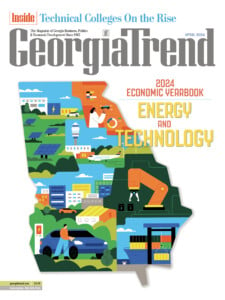Red, Blue & You: Electrifying Georgia
Now is the time to embrace the greener, more affordable future of electric vehicles.

Cars have been part of American life and culture for over 100 years. Not long after the very first car was invented in 1886 – the Benz Patent Motor Car – personal vehicles became synonymous with the freedom inherent to our country’s way of life. Most families have at least one car, if not more. Beyond serving as a tool to get around, cars serve as fashion choices, status symbols and so much more.
That did not happen by accident. Cars are far from the most efficient method of transportation – they’re expensive, they take up a lot of space and they emit an average of nearly five metric tons of carbon dioxide each into the atmosphere every year.
In the early days of car manufacturing, governments in cities, states and Washington, D.C. made a conscious choice to support their domination over other forms of transportation, such as streetcars and trains.
Perhaps the best-known legislation supporting gas vehicles is the Federal Aid Highway Act of 1956 which authorized spending $25 billion (the equivalent of $264 billion now) for the construction of 41,000 miles (66,000 km) of the interstate highway system over a 10-year period. It was the largest public works project in history at the time.
Even now, the U.S. spends approximately $26 billion per year subsidizing fossil fuel companies, of which $15 billion is dedicated to oil and gas production.
In other words, gasoline-powered cars are the default only because leaders, both past and present, decided they would be.
However, it’s not the 1960s or even the 1990s anymore. Electric vehicles (EV) have made incredible strides in efficiency, affordability and viability in the last 20 years, and consumers have started to take notice here in Georgia.
Today, our state ranks 11th in the country for registered EVs with over 45,000 on the roads, according to data from the Electric Power Research Institute. That same data shows that between 2020 and 2021, EVs went from being 1.6% of all cars purchased in Georgia to 2.9%, an 80% increase in just one year. The institute projects that there will be over 1 million registered EVs in the state by 2030.
Right now, we are not prepared to meet that demand. According to Atlas Public Policy, there are only 3,600 publicly available chargers in Georgia currently. We need to get up to 18,000 by 2030 to be ready for an electric vehicle future.
Until charging a vehicle is as easy as filling a tank of gas, it will be difficult to make a smooth transition to more efficient, environmentally friendly EVs.
Incentive programs are in place now to encourage charging station construction, such as the Electric Vehicle Supply Equipment Tax Credit here in Georgia. Additionally, the bipartisan infrastructure law passed by Congress in 2021 will allocate $5 billion over the next five years with the goal of creating a national EV charging network. However, it will take a comprehensive, large-scale effort akin to that of 1956 to get where we need to be.
While the environmental benefits are clear, what’s less commonly known is how consumers would benefit from embracing EVs. Owners who drive 15,000 miles in their electric car in a year spend roughly $546 on power, versus $1,255 in a gas-powered car, according to one study by the nonprofit American Automobile Association (and it’s worth noting that this was prior to the cost of gas skyrocketing). Additionally, EVs have lower maintenance costs, making them cheaper than gas-powered cars in their lifetime, costing about $8,000 over the average course of a car’s life.
Our reliance on gas-powered vehicles has long been a choice, and now is the time to choose differently.
As the costs of EVs and renewable energy sources decrease, the cost of a finite resource like gas will only continue to increase. The longer we wait to make the shift, the more expensive it will be for millions of families.
Georgia has an opportunity to be a leader in this space, leadership we are already beginning to show by supporting companies like Rivian and Hyundai Motor Group, which recently announced plans for the construction of a new EV plant in Bryan County near Savannah.
There are no downsides to embracing a greener, more affordable future. And there is no better time to do it than now.






